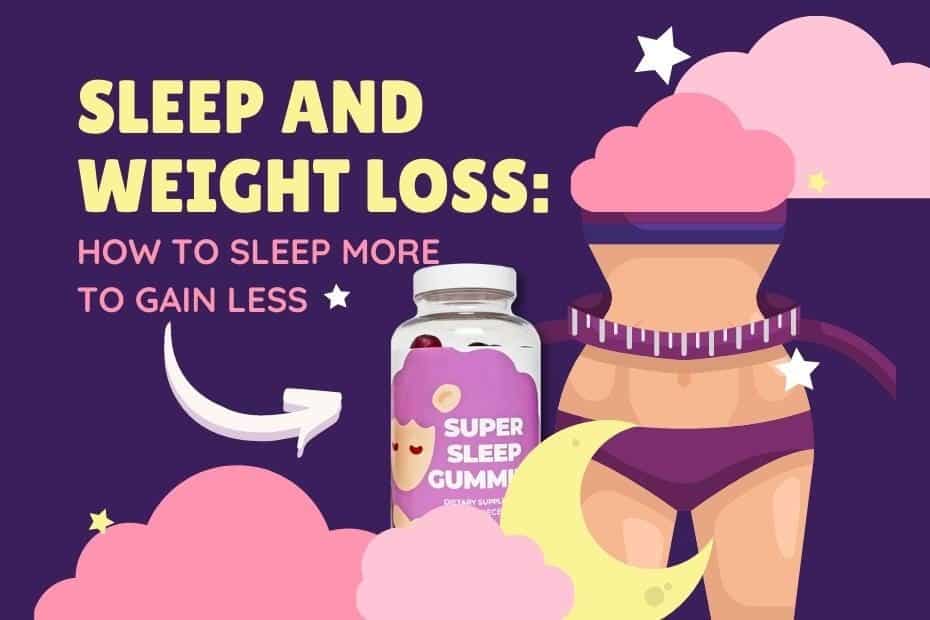Did you know that there is a huge connection between sleep and weight? We’re going to talk about how your nightly ZZZs play a role in your weight!
Everyone knows that eating well and exercising regularly are two of the key factors when it comes to maintaining a healthy weight. But there’s a sneaky third element that so many people ignore: sleep!
Sleep plays a much larger role in weight management than many people realize. The good news: prioritizing getting quality sleep can help you shed pounds and maintain your weight! That’s a weight management strategy anyone can get behind.
We’re going to talk about the link between sleep and weight, and what you can do to ensure you’re getting the best possible sleep!
The Connection Between Sleep and Weight
There are many different reasons as to how being well-rested can affect your weight maintenance journey. Here are some of the most notable ways that your weight can be influenced by your sleep patterns!
Sleep May Prevent Weight Gain

Tons of research has revealed that getting less sleep each night is linked to a greater risk of weight gain and obesity.
This is in part due to the fact that poor sleep influences the body’s hunger hormones. When you don’t get enough sleep, the body produces more ghrelin (which is responsible for feelings of hunger) and less leptin (which is responsible for making you feel full). This ultimately leaves you feeling hungrier than you would typically be after a good night’s rest.
Similarly, poor sleep triggers a spike in cortisol, which is a stress hormone. When your body has higher levels of cortisol, it is triggered to conserve energy. This means it holds onto fat storage, and also decreases insulin sensitivity.
A Good Night’s Sleep Encourages Physical Activity (and Vice Versa!)

As we all know, regular physical exercise is essential for weight management and maintaining a healthy lifestyle. As it turns out, it also plays a key role in our sleep! Studies have shown that people who regularly exercise are typically able to fall asleep faster and get a better quality of sleep.
On the flipside, researchers have also found that, when people consistently get a good night’s sleep, they are more likely to stick with their workout routine. Of course, we don’t need research to tell us that. Fitting in exercise when you’re groggy and tired is not an easy feat!
Beyond that, sleep doesn’t just help you stay active – it improves your physical performance! Studies have shown that sleep affects endurance, motor skills, muscular abilities, and reaction time.
Poor Sleep is Connected to Poor Eating Habits

There are a few ways that sleep deprivation can influence your eating habits. One is that, when you aren’t well-rested, your appetite and cravings for unhealthy foods can increase. Similarly, poor sleep can affect your brain and decision making skills, which can make it more difficult to resist the less nutritious food that you’re craving.
Interestingly, research has also shown that, when you’re sleep deprived, the brain’s rewards centers are more activated by food! All of these factors play a major role in influencing your eating habits.
Going to Bed at a Reasonable Time Prevents Late Night Snacking

Have you ever reached for a late night snack out of sheer boredom? More than likely, your answer is a resounding “yes”!
When you stay up late, you’re more likely to eat unnecessary calories. This is simply due to the fact that there are more waking hours – which means there is more time to eat! Since not being well-rested can affect both your cravings and your decision making skills, you’re also more likely to reach for less healthy options in the late hours of the night.
How to Sleep Better for Weight Management
There are quite a few ways that you can work towards getting a better night’s sleep for weight management and your overall health. Here are our top three tips for sleeping better each and every night:
- Maintain a Regular Sleep Schedule: Going to bed and waking up at the same time is one of the most impactful ways to ensure you’re getting the best possible sleep. It may not always be easy, but major shifts in your sleep schedule can lead to a poorer quality of sleep, ultimately impacting your greater health goals.
- Try Melatonin Gummies: We absolutely love taking melatonin supplements as a natural way to help us get to sleep – and stay asleep! Our Super Sleep Gummies are the perfect solution for anyone looking to improve their sleep quality. These vegan gummies have a tasty berry flavor, and help you wind down before bed to get an amazing, deep slumber!
- Limit Foods and Drinks that Negatively Affect Sleep: In the late afternoon and evening, try your best to avoid consuming anything that may impact your sleep quality. Some of the biggest culprits include alcohol, caffeine, spicy food, and anything that contains a high amount of added sugar.
- Don’t Exercise Too Close to Bedtime: While exercise is essential for losing and maintaining your weight (and helping your sleep quality!), working out too close to bed can actually negatively impact your sleep! You need to give some time for your heart rate to slow down so that you can rest more peacefully. Aim to stop any intense exercise at least an hour before bed.
Ready to get the best sleep ever? Check out our vegan Super Sleep Gummies!
If you want more health, wellness, and lifestyle tips, click here to check out our blog!
